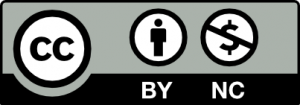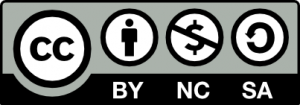3 Creative Commons
Creative Commons
Creative Commons (CC) is a nonprofit organization which “enables sharing and reuse of creativity and knowledge through the provision of free legal tools. Our legal tools help those who want to encourage reuse of their works by offering them for use under generous, standardized terms” (Creative Commons, n.d.).
It was started in 2001 in the United States by Lawrence Lessig, a Stanford Law professor and Hal Abelson, a MIT Computer Science Professor and Eric Eldred, a publisher dedicated to publishing works that had passed into the public domain.
The organization states its’ vision is to “Help others realize the full potential of the internet.”(Creative Commons, n.d.)
CC commonly refers to a form of licensing which gives the creator a choice in how other people can use their work.
This video provides an overview of the purpose of Creative Commons and its; differences from Copyright.
OER, Wanna Work Together by Creative Commons under a Creative Commons Attribution license
Copyright v Creative Commons
Copyright refers to the “exclusive legal right to produce, reproduce, publish or perform an original literary, artistic, dramatic or musical work. The creator is usually the copyright owner”. (Canadian Intellectual Property Office).
Most intellectual property is covered by copyright on creation and it remains in place for the creator’s lifetime plus another 50 years after death when it returns to the public domain.
Creative Commons Licenses do not invalidate copyright but they build on the copyright by allowing the work to be used with an attribution. This means that the the intellectual property remain the property of the copyright holder. Creative Commons states, “CC licenses are copyright licenses, and depend on the existence of copyright to work. CC licenses are legal tools that creators and other rights holders can use to offer certain usage rights to the public, while reserving other rights.”
Attribution
Attribution is given to work using the following:
Title, Creator, Source, License.
Example:

- Title: “A rock with the word smile on it ”
- Creator: “Nick Fewings on —with a link to their profile page
- Source: “Unsplash“—with a link to the original photo on Unsplash
- License: “CC BY 4.0”—with a link to the license deed
For more information and best practices in using attributions, check out the CC Wiki.
Creative License Elements
Each Creative Commons license is made up of one or more of 4 license elements:
Attribution (BY)

“BY” refers to attribution. This means in order to use the work, you must attribute the author of the work. All of the Creative Commons licenses require this condition.
Share Alike (SA)

Share Alike means that if you create an adaptation of a work that has this license, the adaptation must be licensed under the same or a compatible license.
NonCommercial (NC)

NC means that the work may only be used for non-commercial purpose. In NC licenses, non-commercial is defined as “not primarily intended for or directed towards commercial advantage or monetary compensation” (see, e.g., CC BY-NC 4.0). What matters here is the use to which the work is being put, not the user: one has to consider whether the use is for a commercial purpose, not whether the user is a commercial entity.
No Derivatives (ND)
 ND means that you cannot share an adaptation of the work, though you could use and share it in its original form. An example of an adaptation of an image would be changing its colour, blurring it, or adding another image on top of it. An example of an adaptation of a written work would be translating it to a different language
ND means that you cannot share an adaptation of the work, though you could use and share it in its original form. An example of an adaptation of an image would be changing its colour, blurring it, or adding another image on top of it. An example of an adaptation of a written work would be translating it to a different language
.For more information on these elements, check out the CC Wiki
Types of Creative Commons Licenses

JoKalliauer; foter, CC BY-SA 3.0 <https://creativecommons.org/licenses/by-sa/3.0>, via Wikimedia Commons
Attribution
CC BY

This license lets others distribute, remix, adapt, and build upon your work, even commercially, as long as they credit you for the original creation. This is the most accommodating of licenses offered. Recommended for maximum dissemination and use of licensed materials.
Attribution-ShareAlike
CC BY-SA

This license lets others remix, adapt, and build upon your work even for commercial purposes, as long as they credit you and license their new creations under the identical terms. This license is often compared to “copyleft” free and open source software licenses. All new works based on yours will carry the same license, so any derivatives will also allow commercial use. This is the license used by Wikipedia, and is recommended for materials that would benefit from incorporating content from Wikipedia and similarly licensed projects.
Attribution-NoDerivs
CC BY-ND

This license lets others reuse the work for any purpose, including commercially; however, it cannot be shared with others in adapted form, and credit must be provided to you.
Attribution-NonCommercial
CC BY-NC

This license lets others remix, adapt, and build upon your work non-commercially, and although their new works must also acknowledge you and be non-commercial, they don’t have to license their derivative works on the same terms.
Attribution-NonCommercial-ShareAlike
CC BY-NC-SA

This license lets others remix, adapt, and build upon your work non-commercially, as long as they credit you and license their new creations under the identical terms.
Attribution-NonCommercial-NoDerivs
CC BY-NC-ND

This license is the most restrictive of our six main licenses, only allowing others to download your works and share them with others as long as they credit you, but they can’t change them in any way or use them commercially.
Key Takeaways
- Creative Commons licenses are built on top of copyright and work within existing copyright laws. Due to this, creators are able to retain copyright while granting others permission to use their work.
- There are four elements to Creative Commons licenses – Attribution (BY), Share Alike (SA), NonCommercial (NC), and Non Derivatives (ND).
- The four elements are used to create 6 types of Creative Commons licensing.
- All licenses require attribution (title, attribution, source, license).
- NonCommercial (NC) is determined by whether the use of work is for commercial purpose, not whether the user is a commercial entity.

